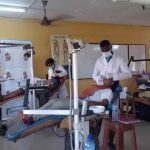The Subnational Audit Efficacy Index report conducted by Paradigm Leadership Support Initiative, has ranked Benue, Borno and Kano low in transparency and accountability in the management of public funds.
The report revealed that of the 36 states that was surveyed Benue, Borno and Kano state were ranked 34th, 35th and 36th positions while Akwa Ibom,Yobe and Kastina were ranked 1st to 2nd.
Nigerian government in 2019, launched a new financial transparency policy and web portal to provide the public with greater insight into government expenditures.
The policy sets minimum financial reporting requirements and regular deadlines for over 800 government Ministries departments and agencies.
Some state governments are still lagging behind in implementation of this policy.
Paradigm Leadership Support Initiative carried out a Subnational Audit Efficacy Index report in 2022 to examine the level of transparency and accountability in the management and implementation of public funds and policies
Among other things, the report reveals that 21 states did not publish audit reports for the year 2021 as only 11 states out of 36 states published the Citizens Accountability report online during the year.
It also revealed that none of the states produced a standard performance audit report on government programmes, projects and policies in 2021 while only 5 out of 36 states have effective public accounts committees in their Houses of Assembly.
The group stressed the need for Governors to exhibit strong political will to achieve financial autonomy for audit offices.
The report stressed the need to strengthen the capacity of auditors to effectively conduct performance audits and produce standard reports.
NIGERIA’s DEBT ROSE BY 4.96% TO N46.25 TRILLION IN 4TH QUARTER 2022 – NBS
The National Bureau of Statistics (NBS) has revealed that in the fourth quarter 2022 (Q4 2022), Nigeria’s domestic and external debt profile hit N46.25 trillion.
It rose by 4.96% from the N44.06 trillion of the preceding quarter, according to the Bureau in its document titled: “Nigeria’s Public and Domestic Debt (Q4 2022.”
NBS said: “Nigeria’s public debt stock which includes external and domestic debt stood at N46.25 trillion (US$103.11 billion) in Q4 2022 from N44.06 trillion (US$ 101.91 billion) in Q3 2022.
“This shows that public debt (in national currency) grew by 4.96% in Q4 2022.”
The data noted that external debt stood at N18.70 trillion (US$41.69 billion) in Q4 2022, while domestic debt was N27.55 trillion (US$61.41billion).”
It however, added that the share of external debt to total public debt stood at 40.44% in Q4 2022, while domestic debt was recorded at 59.56%.
Besides, NBS said the Federal Government share of domestic debt was 80.62% in Q4 2022.
On state profile analysis, according to the report, Lagos recorded the highest domestic debt in Q4 2022 with N807.21 billion, followed by Delta with N304.25 billion and Ogun with N270.45 billion.
NBS said on the other hand, the lowest debt was recorded in Jigawa with N43.95 billion, followed by Kebbi and Katsina with N61.31 billion and N62.37 billion respectively.
Empowerment; Navy Officers Wives Association Trains, empowers women
The Naval Officers Wives Association has trained and empowered some women in vocational skills in Oghara, Delta State as part of it’s effort to reduce high rate of unemployment in Nigeria.
The President of the association and Wife of the Chief Naval Staff Nana Gambo while speaking at the maiden graduation of NOWA Skills Acquisition Centre at the Nigerian Navy Headquarters Logistics Command, Oghara said the group will continue to contribute it’s quota towards reducing unemployment.
It is the inaugural graduation of the NOWA Skills Acquisition Centre, Oghara Ethiope East council Area of Delta State as these women after the completion of their three months training in catering, fashion designing and Make up Artistry are ready to start their businesses
President of the Association who is represented here believes women are the most affected by the high unemployment rate and economic downturn in the country, the reason for the initiative
For the participants who are mostly women from the host community, this is an opportunity of a lifetime which will benefit them and their families
Certificates of graduation were handed to the excited beneficiaries as well as start up packs to enable them establish their businesses.














